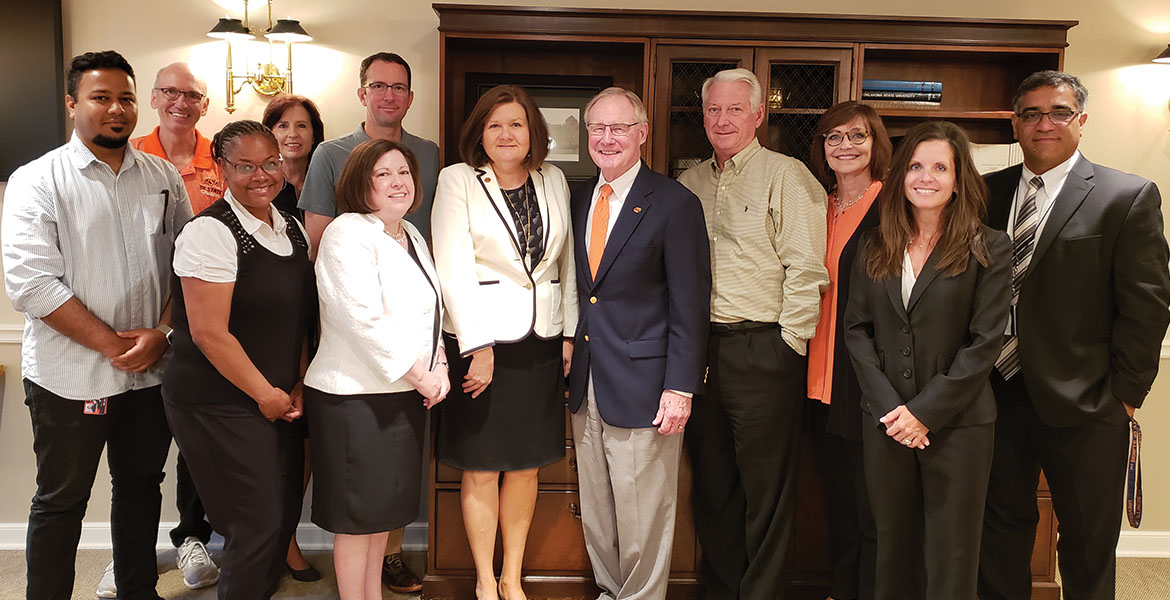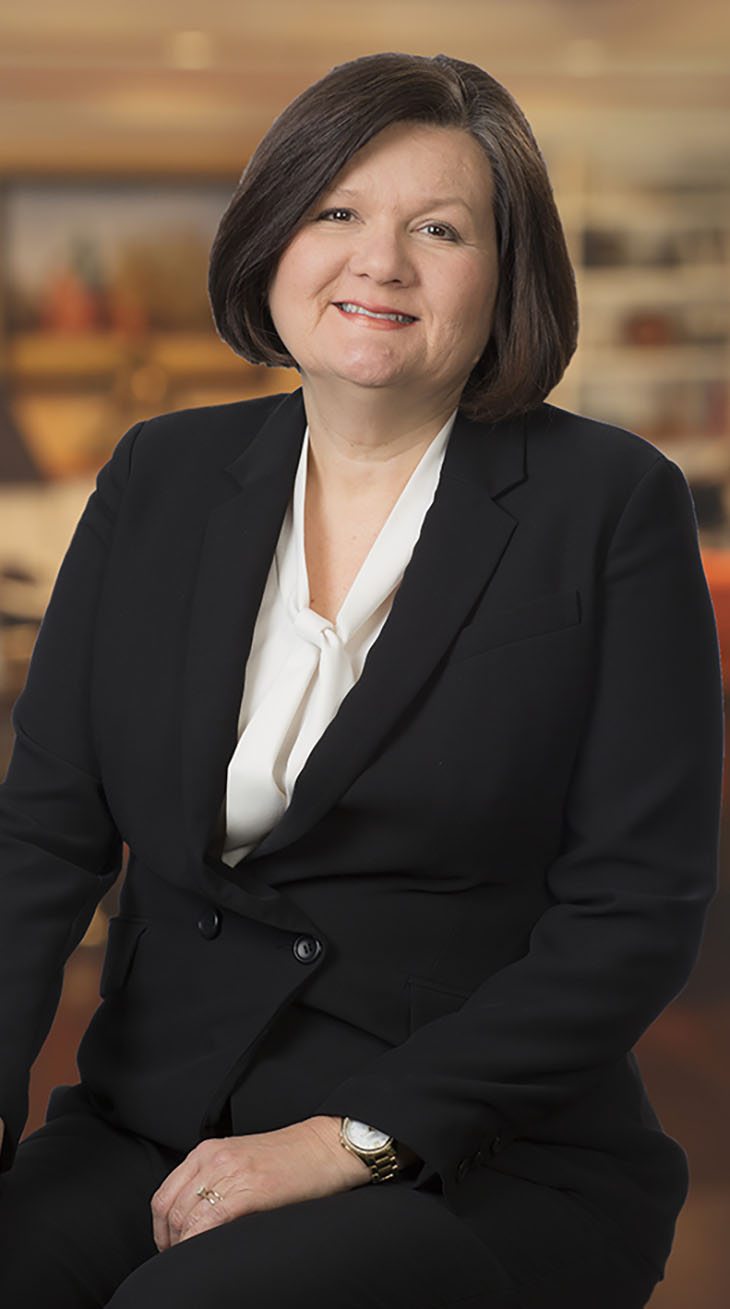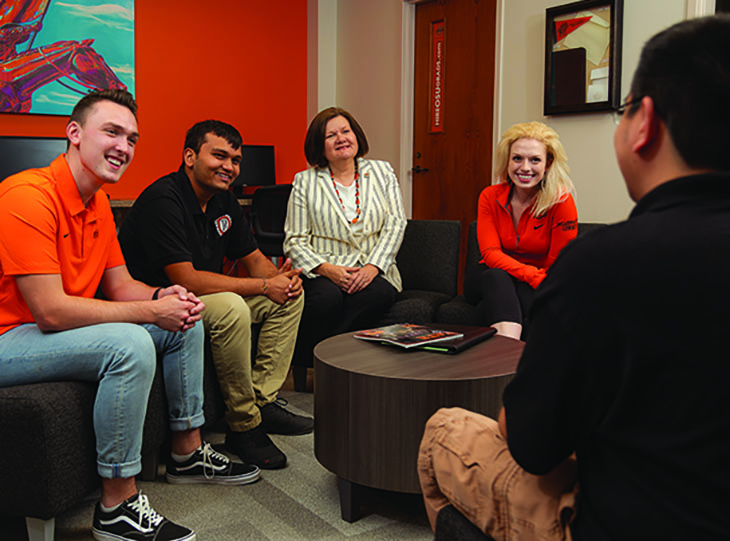
A Time for Tulsa
Monday, December 2, 2019
New OSU-Tulsa president shares bold vision for the future
Pamela Martin Fry began her role as OSU- Tulsa’s third president on July 1. However, she began making a significant impact on academics at the Stillwater and Tulsa campuses long before that. Fry joined OSU’s administration in 2001 as the head of teaching and curriculum leadership, later serving six years as dean of the College of Education. She was also interim provost from 2013 to 2014.

Most recently, she served as vice provost at OSU Stillwater and as OSU-Tulsa’s provost and vice president for academic affairs. In those roles, Fry led the creation of OSU’s University College, which focuses on student academic success and includes such support areas as the University College Advising Office, Veteran Student Academic Success Center, improved transfer student services and expansion of LASSO tutoring services.
“Pam journeyed from faculty to department head to dean to her provost positions,” said Sheryl Tucker, vice provost for OSU-Tulsa and dean of the OSU Graduate College who chaired the presidential search committee. “Her history of leadership, growth, increasing responsibility and promotion fully equipped her for the OSU-Tulsa presidency.”
Fry bleeds orange. She became a Cowboy decades ago, earning a master’s degree in applied behavioral studies and a doctorate in curriculum and supervision while being recognized as her class’s outstanding graduate student. Her background also includes 12 years at the University of Oklahoma as a tenured faculty member and administrator at the department head and associate dean levels.
“I have been fortunate to hold administrative positions at 10 different levels at two different research universities, from helping students solve their academic problems, to managing promotion and tenure processes, and to overseeing academic policy,” Fry said. “Each role had its own unique challenges, and they have built upon one another like a staircase. There is no training program for a university presidency, but 30 years in higher education leadership is a good start.”
Vision for Tulsa
In collaboration with faculty, staff, students, alumni and community members, Fry has bold plans to continue to identify signature programs and services relevant to the Tulsa area.
She often talks about how academic programs are crucial to the brand and identity of an institution and critical to its success.
“There is a connection between a school’s academic mission and its connections to the community,” Fry said. “The key word is relevance. In higher education, we need to ask ourselves, ‘How are our mission, programs and research relevant to the broader community?’” At OSU-Tulsa,
Fry and her leadership team work closely with community partners to increase access to degrees, promote diversity and equity on campus and in the community, and serve as an innovation leader.
"My vision over the next few years is for OSU-Tulsa to become a premier, nationally recognized metropolitan and urban-serving research university."
Fry details how OSU-Tulsa contributes to the larger Tulsa community: The institution is dedicated to building access to degrees and certificates that are relevant to the local community and embraces its mandate to serve as a driver of innovation as a research university and contribute to a higher overall quality of life in the area.
“OSU-Tulsa will be an anchor institution in Tulsa and play a key role in building diverse and prosperous communities,” she said.
What’s more, Fry staunchly believes OSU-Tulsa is in a strategic position to contribute to the overall OSU system.
“OSU-Tulsa is OSU’s only actual branch campus — that is, our programs and faculty flow between the Stillwater and Tulsa campuses. This arrangement provides great efficiency in costs for program delivery and other types of services. In addition, students take courses at both campuses in a variety of formats including face-to-face, hybrid and online.” Fry also believes the OSU-Tulsa campus presents a tremendous opportunity for the university to fulfill its land-grant mission in a metropolitan, urban-serving setting.
A big-picture thinker, Fry is no stranger to leveraging her influence to improve the education system. Over her career, she has provided educational leadership at local, state and national levels, including as editor of one of the top national journals in teacher education and as one of four nationally elected representatives to the board of directors for the American Association of Colleges of Teacher Education. At the community level, she served two terms as a Stillwater Public Education Foundation trustee and was honored with the 2010 SPEF Pioneer Service Award.
A first for women
As the first female president of OSU-Tulsa, Fry will leave a legacy for future women in academic leadership. Research on women and leadership shows that even as women continue to manage more roles in their personal lives and their professional assignments, they often hesitate to speak up or assert themselves in the workplace.
“To address those challenges, especially early in my career, I found personal and professional networks to be especially important, along with carefully chosen role models and mentors,” she said.She also found it important to be “over- prepared” for meetings with key points in mind. This approach gave her confidence to speak up and express her thoughts and opinions.
“Now, I find it incredibly meaningful to assist others in their development as leaders, especially those individuals who are struggling with difficult circumstances,” she said.
The desire to help others succeed is a theme throughout Fry’s research, which has focused on analysis of teaching, learning and curriculum at both the P-12 and collegiate levels. She has taught courses in educational philosophy, leadership, management and advocacy, curriculum development, teaching and assessment of learning and evaluation and improvement of educational institutions.
Context of Accomplishment
When strategizing or discussing new initiatives, Fry frequently refers to Simon Sinek’s book, Start with Why. “The premise is that people like Martin Luther King Jr., Steve Jobs and the Wright Brothers had little in common, but they all started with ‘why.’ They realized that people won’t truly buy into a product, service, movement or idea until they understand the ‘why’ behind it,” Fry said.

“My ‘why’ is helping others build a better life through education, at any age and at any level. From my earliest memories, this has served as a motivation for my life choices and career path.”
Fry’s proudest achievements center on putting her research into action to help students succeed.
“Our Veteran Student Academic Success Center in Stillwater and Veteran Success Center in Tulsa were much-needed resources for a traditionally underserved population,” she said. OSU now offers support for military-affiliated students and their families on both campuses. As of 2018, OSU went from unranked to 57th in the nation for its efforts as a veteran-serving institution, according to Military Times.
Fry also led efforts to provide enhanced services for transfer students, particularly in Tulsa.
“The greatest predictor of transfer student success at a four-year institution is the number of credits that transfer,” Fry said. “By working closely with two-year institutions to provide early advising and coordinated student services, we can guide students to take classes that apply to their desired OSU bachelor’s degree program. By working together, we will continue to improve outcomes for our transfer students.”
When reflecting on her journey at OSU, Fry points to one — more personal — accomplishment that illustrates her passion for the university.
“All three of my children earned their bachelor’s degrees from OSU. I clearly believe in the value of an OSU degree!”
